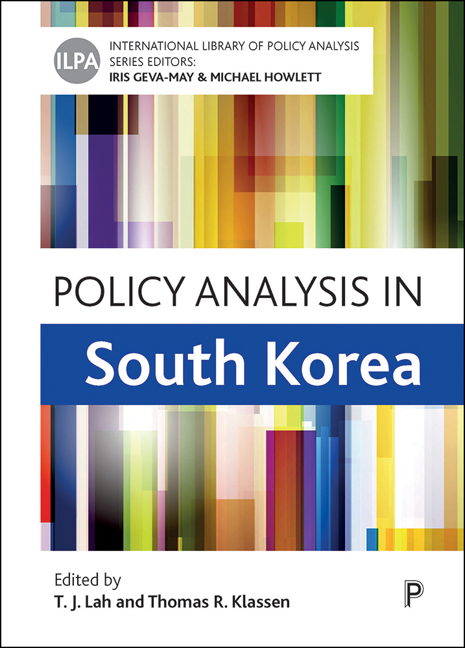Book contents
- Frontmatter
- Dedication
- Contents
- List of figures, tables and boxes
- List of abbreviations
- Notes on contributors
- Acknowledgements
- Editors’ introduction to the series
- Foreword
- Part One Overview of policy analysis in Korea
- Part Two Policy analysis by governments
- Part Three Committees, consultants, media, public inquiries and public opinion
- Part Four Parties, interest groups and advocacy-based policy analysis
- Part Five Academia, research institutes and policy analysis
- Index
eighteen - Policy analysis education in Korea
Published online by Cambridge University Press: 18 January 2024
- Frontmatter
- Dedication
- Contents
- List of figures, tables and boxes
- List of abbreviations
- Notes on contributors
- Acknowledgements
- Editors’ introduction to the series
- Foreword
- Part One Overview of policy analysis in Korea
- Part Two Policy analysis by governments
- Part Three Committees, consultants, media, public inquiries and public opinion
- Part Four Parties, interest groups and advocacy-based policy analysis
- Part Five Academia, research institutes and policy analysis
- Index
Summary
The introduction of policy analysis education in Korean universities
To understand policy analysis education in Korea, it is essential to first understand the general history of the field of policy studies in Korea. The development of policy analysis education in Korea has been inextricably related to education on the policy process, which is another major theme of policy studies that has been dominant in university-level education in public policy studies in Korea (Lee, 1998). The beginning of public policy education in Korea can be traced to the introduction of American policy studies in the 1960s, which paralleled education for the umbrella academic field of public administration and public policy in the 1950s (Roh, 1996). American policy studies began to be introduced as a part of the curriculum for public administration and public policy departments in Korean higher education institutions in the late 1960s by scholars who graduated from universities in the United States (US) and returned to work as professors in Korean universities (Kim and Lee, 1995).
Before the late 1960s, the initial curriculum for public administration and public policy at Korean universities included courses that heavily gravitated toward administrative management materials, and policy education was not clearly established as part of the curriculum (Lee, 1998; Roh, 1996). The reason for this focus lies in the history of education for public administration and public policy in general. Before policy-related courses were introduced, the departments established an administration-oriented curriculum. For example, in 1964, the required courses for students to graduate from Seoul National University (SNU) were organisational management, personnel administration, financial administration, Korean government, research methodology and other optional subjects that were administration-oriented such as Planning, Organising, Staffing, Directing, Coordinating, Reporting and Budgeting (POSDCORB) (Seoul National University, 1964). No required courses were policy-related at that point. This focus subsequently had an impact on the curriculums of SNU and other universities. This tradition of an administration focus remained consistent due to the national need for a field of public administration and public policy to train potential civil service employees.
- Type
- Chapter
- Information
- Policy Analysis in South Korea , pp. 276 - 285Publisher: Bristol University PressPrint publication year: 2023



